When the world discovered the Pacific: 2018 politics review
PACIFIC ISLAND — It was a busy year for the countries of the Pacific, which had more global spotlight than usual as it found itself in the middle of feuding great powers. That brought a slew of new deals and partnerships, but also pressures. RNZ Pacific's Johnny Blades and Jamie Tahana look back on the year the world discovered the Pacific.
On the broad view, the year has been dominated by speculation over China's increasing influence in the region, and the reactions from Australia, New Zealand and the United States. The region was suddenly being splashed across global publications, and delegations from around the world have been visiting with increasing frequency.
For all the talk of shared-histories, family ties, friendship, shared interests and other diplomatic platitudes, beneath the surface was a particular realpolitik. China's forays into the Pacific - which have been going on in the open for many years - were really starting to make the west sweat.
Pacific countries have been visiting Beijing for the red carpet treatment and signing on to the Belt and Road Intiative, but it's drawn warnings from the likes of Canberra and Washington about so-called debt traps and security concerns amid panicked talk of military bases in Vanuatu, which raised both eyebrows and chuckles.
In 2018 Australia and New Zealand reacted with vigour to the China factor, with both Wellington and Canberra launching into their respective Pacific Step-up and Pacific Reset strategies. There have been aid increases, new diplomatic postings, scholarships, infrastructure projects and health programmes, including grand strategies for internet cables and massive electricity projects - and a plan for an Australian naval base in Papua New Guinea which the US has joined in on.
However, much of the analysis around this frenzy barely registered the voices of the Pacific Islands themselves. Far from an oceanic chess board for bigger powers, the Pacific Islands governments are also playing the game - and each other. Generations on from independence, Pacific leaders are acting with increased autonomy and confidence - but that doesn't mean there aren't major problems.
On the broad view, the year has been dominated by speculation over China's increasing influence in the region, and the reactions from Australia, New Zealand and the United States. The region was suddenly being splashed across global publications, and delegations from around the world have been visiting with increasing frequency.
For all the talk of shared-histories, family ties, friendship, shared interests and other diplomatic platitudes, beneath the surface was a particular realpolitik. China's forays into the Pacific - which have been going on in the open for many years - were really starting to make the west sweat.
Pacific countries have been visiting Beijing for the red carpet treatment and signing on to the Belt and Road Intiative, but it's drawn warnings from the likes of Canberra and Washington about so-called debt traps and security concerns amid panicked talk of military bases in Vanuatu, which raised both eyebrows and chuckles.
In 2018 Australia and New Zealand reacted with vigour to the China factor, with both Wellington and Canberra launching into their respective Pacific Step-up and Pacific Reset strategies. There have been aid increases, new diplomatic postings, scholarships, infrastructure projects and health programmes, including grand strategies for internet cables and massive electricity projects - and a plan for an Australian naval base in Papua New Guinea which the US has joined in on.
However, much of the analysis around this frenzy barely registered the voices of the Pacific Islands themselves. Far from an oceanic chess board for bigger powers, the Pacific Islands governments are also playing the game - and each other. Generations on from independence, Pacific leaders are acting with increased autonomy and confidence - but that doesn't mean there aren't major problems.
PNG's sinking feeling: an Air Niugini plane crashed into the sea short of a runway in Micronesia in October, capping a horrendous year for PNG's national carrier. [Photo: Supplied / US Navy]
Papua New Guinea
The APEC summit in Port Moresby brought an intense, albeit brief, global spotlight on the Pacific Islands' largest country, its struggles and its growing geopolitical importance. Having invested so much in hosting APEC, Peter O'Neill's government was powerless to stop the summit being overshadowed by tension between the US and China, although it did come out of it with some big development packages.
However the tide may finally be turning against the wily O'Neill, who has dominated PNG politics for the past seven years, with a motion of no-confidence likely to be tabled early in the new year by an energised opposition. He has so far proven masterful at maintaining the support of a majority of MPs, but the O'Neill government is running low on cash and political capital.
The signs of social breakdown in PNG are many, while people's frustrations with the government boiled over this year in alarming fashion: in the destruction of an Air Niugini airplane in the Highlands, and a rampage on parliament by police and security forces straight after APEC. For a public struggling for access to basic services amongst natural and man-made disasters, the government won no favours by bringing in the Maseratis, nor through an attempt to sideline the country's best journalist.
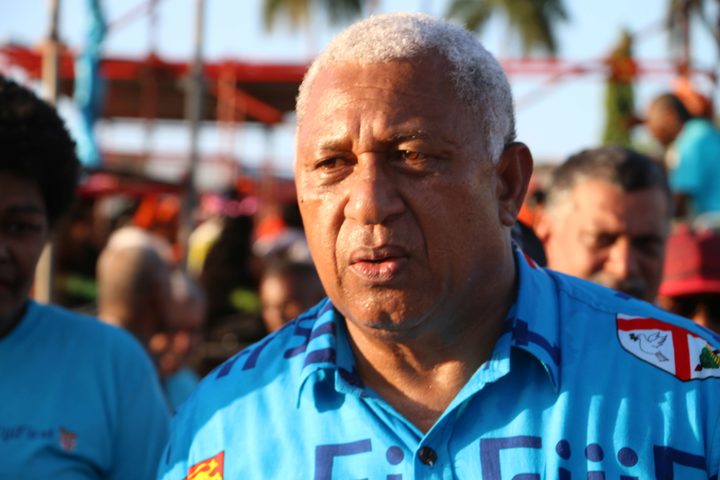
Frank Bainimarama [ Photo: RNZ / Koroi Hawkins]
Fiji
Coup-maker turned elected leader Frank Bainimarama clung to power with a hair's breadth majority of 50.02 percent in this year's election. It was only the second election in Fiji in 12 years after the polls were reinstated in 2014. The former military commander was up against Fiji's first coup leader Sitiveni Rabuka who was at the helm of a rejuvenated Social Democratic Liberal Party (SODELPA).
During short and hotly contested campaigning, Mr Rabuka was called in for police questioning days before the vote and embroiled in a legal challenge brought by Fiji's anti corruption authorities, which threatened to confuse the SODELPA vote. The appeal was dismissed just before election day when pouring rain and floods contributed to a lower than expected voter turnout of 70 percent. Ten female MPs were elected, an encouraging sign given the parlous figures on female representation in Pacific parliaments. Meanwhile, the opposition later failed in its efforts to dispute the election results after an extraordinary game ofhide and seek over the delivery of court documents.
The dismissal of a sedition case against the Fiji Times offered a glimmer of hope for Fiji's media which continues to work under strict rules and harsh penalties.
On the international stage, Mr Bainimarama continued to bask in the limelight with his slick campaign to call out the big polluters over climate change. Fiji glossed up its international image further, winning a seat on the UN Human Rights Council, despite criticism, with plans to to pursue climate change resilience, the rights of children and gender equality in the Pacific.
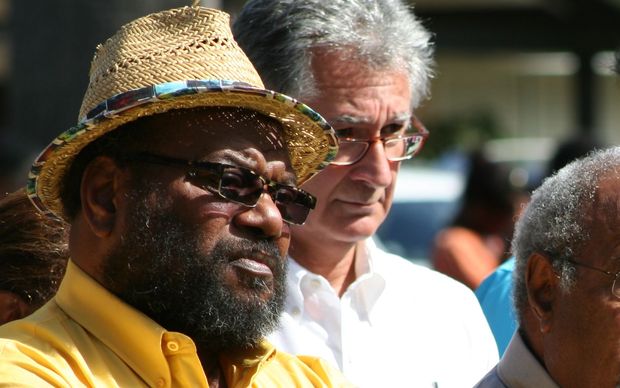
Victor Tutugoro of New Caledonia's FLNKS said they agreed with the French government that the Noumea Accord will continue to be valid during the term which will begin in May 2019 [Photo: RNZ / Johnny Blades]
New Caledonia
2018 was crunch time for the French territory which finally held its independence referendum, as provided for under the Noumea accord of 1998. A smaller than expected majority voted for the status quo, which meant that the independence aspirations of the territory's indigenous Kanaks remain very much alive.
It also clouded the hopes of anti-independence leaders who sought to thwart the Accord's provision for two more referendums. The signatories to the Accord met last week in Paris for formal talks, andas it stands, New Caledonia appears to be on track for another independence referendum.
As far as the indigenous Kanaks' FLNKS movement is concerned, the Noumea Accord provisions with its referendums and roll restrictions remain in place. But Philippe Gomes, the leader of the largest anti-independence party Caledonia Together, says a way has to be found to reinvent an exit from the Noumea Accord.
Bougainville
The Autonomous Bougainville Government has been having more struggles to secure outstanding constitutionally guaranteed payments owed it by PNG's national government. The funds are important for Bougainville as it prepares for a crucial year.
Seventeen years since a decade-long bloody civil war formally ended, the independence referendum promised as part of the 2001 peace agreement is fast approaching. In a plebiscite tentatively set for June 2019, the people of Bougainville are to be asked: do you agree for Bougainville to have Greater Autonomy or Full Independence from PNG?
But several significant questions are yet to be answered, especially when it comes to how an independent Bougainville would support itself. Talks on the possibility of reopening the Panguna mine (which was the catalyst for the civil war) were shelved at the beginning of the year because of the divisive nature of the issue, although other mining projects are being developed.
Meanwhile, PNG's police fraud squad was brought in by the autonomous government after it had announced there was widespread misappropriation within the public service.
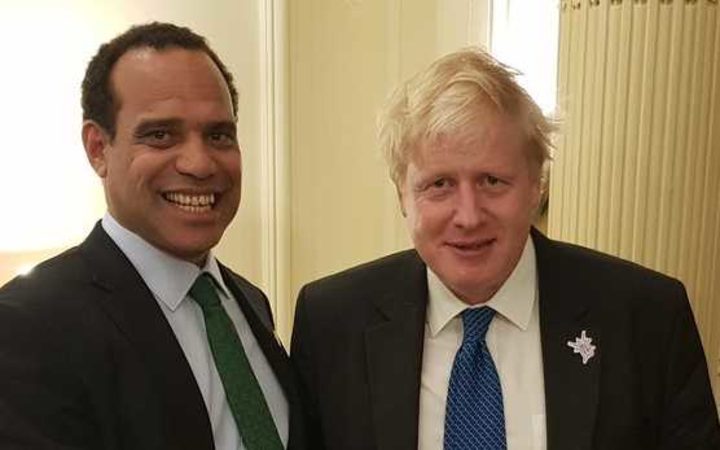
Vanuatu's foreign minister Ralph Regenvanu rubs shoulders with Britain's former Foreign Secretary Boris Johnson who announced the UK would reopen a number of High Commissions in the Pacific. [Photo: Twitter/Ralph Regenvanu]
Vanuatu
Prime Minister Charlot Salwai will enter 2019 as Vanuatu's longest-serving prime minister in a decade: he's been there for nearly three years. His coalition came to power after a cleansing election which followed the 2016 political crisis. The government had a big vision for sweeping political reform, but lately it has encountered speed wobbles and ended this year weakened as the opposition pursued motions of no-confidence.
Mr Salwai lost his deputy prime minister, Joe Natuman, who was convicted in a conspiracy trial and lost his seat. The by-election for Mr Natuman's Tanna electorate saw a feud erupt that ultimately saw two ministers sacked, and the Vanuatu Leaders Party walk away from the governing coalition, reducing its majority. Although the parliament is literally going through the motions, Mr Salwai has managed to get some reforms through. But economic challenges and more hurdles to the reform programme could make for a tough 2019 as Mr Salwai seeks to do what so few Vanuatu prime ministers have been able to: survive a full term. The next election is due in early 2020.
On the international front, foreign minister Ralph Regenvanu has been busy advancing Vanuatu's interests on the issues of climate change and West Papua. On the latter, he has announced that Vanuatu is intending to submit a resolution calling for West Papua to be inscribed on the UN de-colonisation list at next year's General Assembly.On the former, Regenvanu has warned that Vanuatu is considering taking legal action against the world's most polluting fossil fuel corporations and countries.
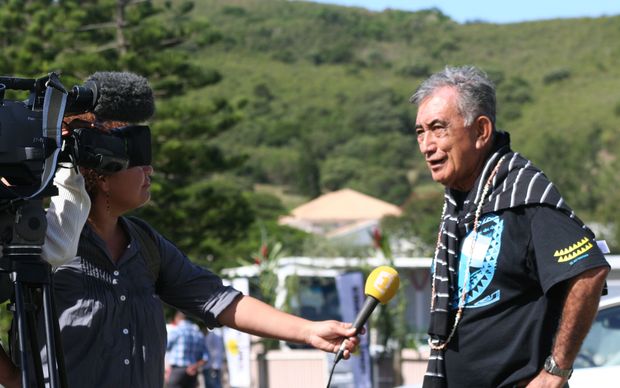
French Polynesia leader Oscar Temaru. [ Photo: RNZ / Johnny Blades]
French Polynesia
After three decades at the heart of French Polynesian politics, pro-independence leader Oscar Temaru was thrown out of the assembly following a classic French-style court ruling. He is to stand trial in the criminal court for allegedly misusing public funds. The accusations stem from a public accounts audit of 2009 questioning allocations given to a radio station asserting sovereignty rights and denouncing nuclear weapons tests.
Meanwhile, the French senate has decided to allow more compensation claims from French Polynesia's nuclear victims. This comes as opposition Tahoeraa Huiraatira party leader, the territory's veteran politician Gaston Flosse, distanced himself from president Edouard Fritch, who admitted to lying about the French nuclear weapons tests.
One of the more intriguing developments in the Pacific this year was the protracted dispute over China's consulate in Tahiti. Despite being given notice in mid-2017 to return the property by the end of February, the Chinese diplomats stayed put, although the consulate appears to be scrambling to contain fallout from the matter.
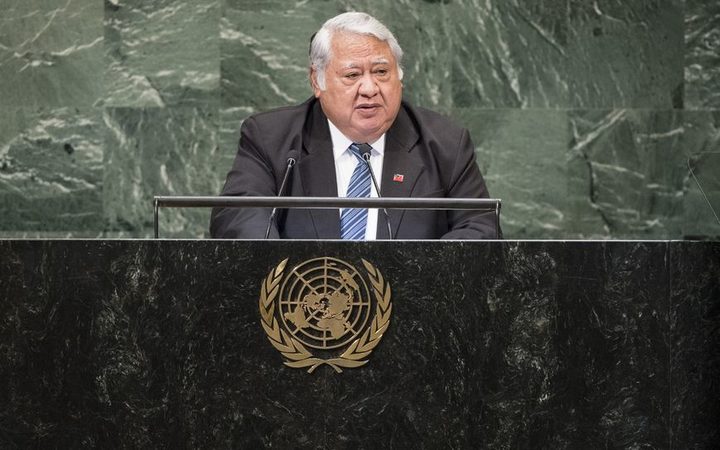
Tuilaepa Sailele Malielegaoi addresses the UN General Assembly in New York [Photo: UN]
Samoa
This year saw the long-standing prime minister, Tuilaepa Sailele Malielegaoi, go head-to-head with the country's largest church over the government's new tax policy which requires church pastors and the head of state to pay income tax.
The Congregational Christian Church refused, and so the government followed through on its threat of legal action. The year ended with nearly a dozen church leaders being hauled before the courts for refusing to pay tax.
The church is also under pressure to take a leading role to stop domestic violence which is at crisis point in the country.
Another nagging political issue, regarding bestowal of the paramount Malietoa title, remains unresolved.
Solomon Islands
In the year since previous prime minister Manasseh Sogavare was ousted, his replacement Rick Hou has been a steady pair of hands at the helm. Parliament passed a considerable raft of bills in 2018, including dual citizenship legislation, and an anti-corrution act, although it remains to be seen how effective the latter will be.
Mr Hou has tweaked the county's foreign policy, departing from the ardent support for West Papuan independence aspirations that was a hallmark of Mr Sogavare's tenure. There is however no guarantee that Mr Hou will be a contender for prime minister after the country goes to the polls in the first half of next year, when the inevtiable post-election horsetrading and hotel lockdowns begin.
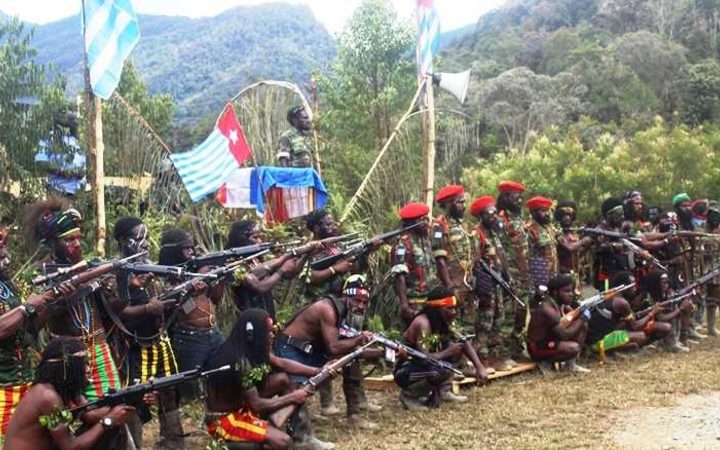
West Papua Liberation Army at the issuance of a declaration of war against Indonesian security forces. [Photo: Supplied]
West Papua
2018 saw the biggest escalation of conflict between the armed wing of the West Papuan independence movement and Indonesia's security forces in many years. The West Papua Liberation Army declared war on the Indonesian state in January. What has followed has been a series of exchanges between the Army and Indonesia's military and police forces in Papua's remote Highlands, culminating in this month's massacre of at least 16 Indonesian road construction workers which the Liberation Army claimed responsibility for. The UN High Commissioner for Human Rights says this violence is the result of grievances in Papua that Indonesia is failing to address.
Indonesian president Joko Widodo says the massacre will not dent his government's massive infrastructure drive which he argues is transforming Papua for the better. While in Nauru this year as part of Indonesia's diplomatic outreach to the region, Minister Wiranto claimed that development in Papua was better than what was generally happening in the Pacific Islands.
New roads and bridges are not however dampening the efforts of West Papuans who continue to struggle for their self-determination aspirations, as evidenced by recent demonstrations which have now spread to non-Papuan cities. That these demos have again seen mass arrests shows how sensitive Indonesia remains to any question of Papua's political status. This also applies to the United Liberation Movement for West Papua which continues to internationalise its cause, even if the Melanesian Spearhead Group has reached an impasse on the matter.
Tonga
The year started with Akilisi Pohiva being sworn in after his Democratic party returned to power in the election in late 2017. Cyclone Gita hit Tonga in February, destroying the old parliament building and causing significant devastation around the country. The recovery and rebuild effort naturally became a preoccupation for the country's leaders.
It was not a year without controversy. Tongan Noble MP and former Prime Minister Tu'ivakano was arrested on charges relating to passport investigation, including bribery and money laundering. Then the Internal Affairs Minister 'Akosita Lavulavu was arrested in March, charged with forging documents and false pretences.
In June a 3,000 strong signature petition to impeach the prime minister and seven of his cabinet ministers was submitted to parliament. The petition also called for an urgent audit of specific expenditure over the last three years regarding the ministers and Mr Pohiva.
Old Tongan Parliament has collopased after cyclone Gita. [Photo: RNZ / Richard Tindiller]
Marshall Islands
Continuing the work of the previous government -- particularly the late foreign minister, Tony de Brum -- President Hilda Heine has been busy on the global stage, advocating for global action on climate change, which continues to be a frustratingly slow and difficult battle for countries like the Marshalls. And the threats were present again this year, with atolls regularly inundated by the sea, a debilitating drought, and another El Niño phase looming.
At home, though, it was not easy going for Ms Heine's government. The President last month survived a motion of no confidence by the narrowest of margins, blaming Chinese influence for the vote, and accusing opposition senators of being bought out. However the opposition said Dr Heine's plans to introduce cryptocurrency as a legal tender were behind the motion, because it had tainted the country's reputation.
Pacific Islands Forum
All eyes turned to Nauru in September as it hosted the Pacific Islands Forum's annual leaders' summit. The meeting was controversial before it even started, with the restrictions placed on media reporting it - particularly its ban on Australia's public broadcaster, the ABC.
It was a summit where problems lurking beneath bubbled to the surface. Fiji, as it has for years, refused to attend; a New Zealand journalist, Barbara Dreaver, was briefly detained as she interviewed refugees held on the island; the tug-of-war between China and Taiwan re-emerged dramatically, starting with a spat over visas for the Chinese delegation and ending with the Chinese storming out of a meeting chaired by Nauru president Baron Waqa (Nauru is one of Taiwan's few remaining diplomatic allies).
Adding to the chaos, Australia misstepped with the region again, when it emerged that it tried to water down a resolution on climate change - the only country opposed. That led leaders from Vanuatu and Tuvalu to publicly rebuke Australia.
At the end there was an agreement on security cooperation, but not a lot more. If anything, the Nauru summit highlighted the Forum's struggle for relevance in a region undergoing geopolitical turbulence.
Minister of Foreign Affairs Winston Peters speaks to the media after his meeting with Australian Minister of Foreign Affairs Marice Payne in Nauru during the Pacific Island Forum. [Photo: New Zealand Herald/Jason Oxenham]
Nauru
Domestically, the Nauru government's campaign to punish its detractors soldiers on. It has appealed the acquittal of the so-called Nauru 19, a group which includes a former president of the country, who had been charged over an anti-government protest more than three years ago.
In September the group successfully sought a permanent stay on legal proceedings against them, arguing the trial process had dragged on too long and that the government had not met a court order to meet some of the costs.
Justice Geoff Muecke had referred to the government's conduct throughout the lengthy legal process as a "shameful affront to the rule of law". Three of the group, who had already pleaded guilty, failed on appeal to overturn their sentences and are now serving jail terms.
Guam
The US territory of Guam will begin 2019 with a big change at the top. In the US midterm elections in November, a Democrat, Lou Leon Guerrero, was elected to become the island's first woman Governor. She will take over from Eddie Calvo, who reached his term limit. The Democrats swept many of the key positions, including the delegate to Washington DC. Furthermore, ten of the island's congress people will be women.
But Guam's going through some uncertain times. As the hostility between the US and China ramps up, the island - two thirds of which is owned by the US military - is increasingly under pressure. It's been threatened by North Korea, and is likely to find itself in strategic crosshairs again, sitting on the fringe of Asia. The Pentagon's plans to boost the military's presence on the island by tens of thousands of troops and sailors is controversial, and saw some testy exchanges between Mr Calvo and Washington. These will continue to unfold in 2019, and how Ms Leon Guerrero handles them will be important.
Washington's plans, and the continued status under the United States (as a territory, its people can't vote for President, its congresswoman has no say, and constitutional rights do not apply) has given impetus to the Chamorro independence movement. A change in political status is something Mr Calvo hoped to drive, but his plans ulimately foundered.
Tokelau Administrator, Ross Ardern, in Apia, Samoa. P[hoto: RNZ PACIFIC / MACKENZIE SMITH]
Tokelau
A new government in New Zealand came bearing gifts for its distant territory. This year a new administrator, Ross Ardern (the father of Jacinda Ardern), travelled alongside the first Tokelauan government Minister in New Zealand, Kris Faafoi, to Tokelau in September. It was also the first Ministerial visit to Tokelau since 2004. The pair have secured a commitment from Ms Ardern to visit by 2020.
Meanwhile, Tokelau itself has undertaken political reforms, moving several government positions from offices in Samoa back to the atolls. Efforts are underway to empower the Taupulega, or village councils, amid fears a select few leaders were acting out of turn. These moves have the backing of the UN.
But an ongoing legal dispute against Tokelau's government, launched by two aggrieved former public servants, has caused widespread political division in the territory. It has highlighted what some see as New Zealand's heavy-handed approach to its administration of Tokelau.
Cook Islands
The government of Henry Puna narrowly won re-election inn June, although this could be under threat with one MP since removed by an election petition and another forced to spend months out of the country, reportedly due to ill-health.
The Rarotonga water reticulation system, underway for five years, is due for completion at the end of 2019, but before then a squabble with the Chinese firm involved needs to be resolved. China Civil Engineering and Constructionhas been accused by the government of not delivering what was contracted on Stage One and legal action is underway. Stage Two is being built by a New Zealand company with New Zealand also helping pay to fix the mistakes blamed on the Chinese.
The government's efforts to advance a fisheries agreement with the European Union continues to run into flak with the courts ruling in favour of the country's chiefs and environmentalists who sought limits on foreign involvement in the fishery. Seabottom mining is also something the government is pursuing and again it is an activity drawing opposition from a number of groups.
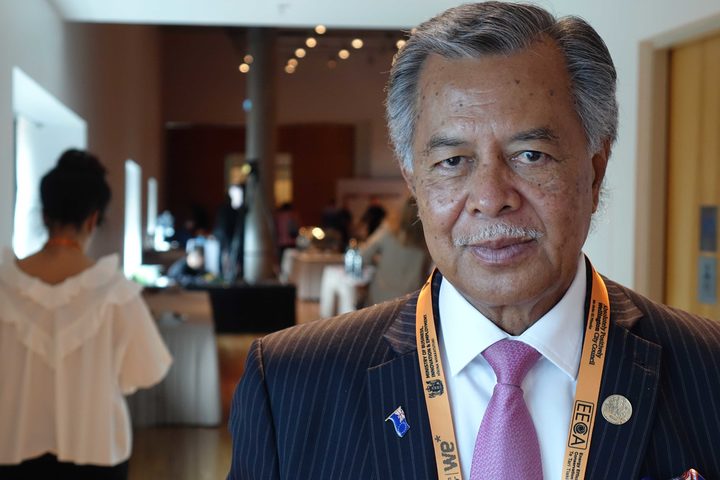
Cook Islands Prime Minister, Henry Puna, at the Asia Pacific Energy Leaders' Summit, 1 November 2018, Te Papa, Wellington. [Photo: RNZ / Johnny Blades]
Niue
Under its Premier, Sir Toke Talagi, Niue has charted its own course this year, signing on to China's Belt and Road initiative, dropping the New Zealand anthem from its Constitution Day celebrations and rejecting concerns from New Zealand auditors over its financials.
Sir Toke's government remains stable, but the issues raised by New Zealand's Auditor-General will linger into the new year, as well as unconfirmed reports of China's growing influence in Niue.
Australia
Australia dived head-first into its much-touted Pacific 'step-up' this year, yet far from taking strident steps, Canberra managed to bungle a lot along the way.
It announced billions of dollars worth of projects around the region - from infrastructure, to health, to telecommunications, to a naval base and a massive electricity project in PNG (which may not be as straightforward as it sounds). But there was no hiding the fact that the main driver for Canberra's renewed interest in the region was China.
Australia remains the region's largest donor by some margin, but it's out of sync with some of the region's key concerns. There was the drive to water down the climate communique at the Pacific Islands Forum, and then the lack of climate policy and promotion of coal at home was obvious to the leaders of island states who looked on in disdain.
Then came the threat to Australia's small but important seasonal workers programme. Despite Australia now being a member of the UN Human Rights Council, its policy of detaining of refugees on Manus Island and Nauru, has spiralled a humanitarian crisis for Canberra, with little prospect of ending soon.
Then, in the latest crisis at the bottom of the Pacific's arc of instability, Prime Minister Malcolm Turnbull was jettisoned from the top job, and his foreign minister Julie Bishop - who front-footed the step up - resigned the portfolio. Mr Turnbull was replaced by Scott Morrison, the former immigration minister who once hugged a lump of coal in parliament.
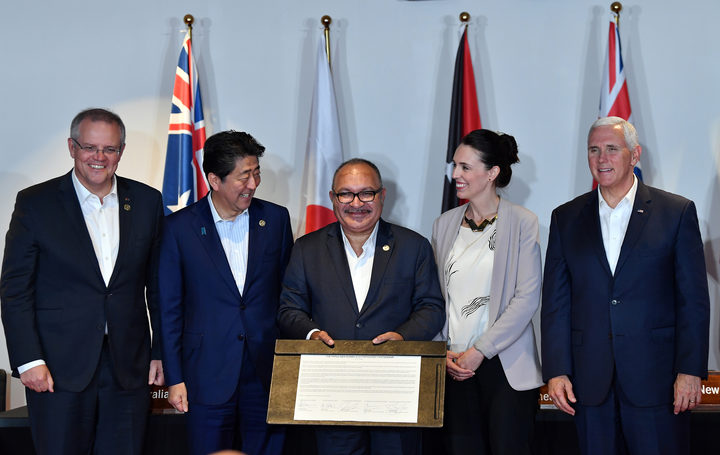
Leaders of Australia, Japan, Papua New Guinea, New Zealand and the US vice-president announce a major elecricity project in PNG during November's APEC summit. [Photo: AFP]
New Zealand
New Zealand's new government kicked off the year by announcing its so-called Pacific Reset, which foreign minister Winston Peters said was about "resetting" the relationship with the Pacific, trying to listen more to the Pacific Islands as an equal. While it doesn't have the deep pockets of Canberra, Washington or Beijing, New Zealand also announced significant increases to aid and projects in the region, and is significant boosting its diplomatic presence.
New Zealand's approach is also about trying to firm an image independent from Australia and the US. In the Pacific, New Zealand and Australia are often thought of as much of the same which, as described above, can make things difficult with what's going on across the Tasman. But this policy is as much about the need to maintain New Zealand influence in the islands in the face of China's surge, even if Wellington's words have been less brazen than Canberra. In recent times, New Zealand's own relationship with China has come under increased scrutiny in its domestic politics.
There are signs that Winston Peters's Reset policy has gone down well with Island governments, and we can expect further big announcements next year.

![From left: PNG's Foreign Minister Rimbink Pato, Prime Minister Peter O'Neill and Chinese President Xi Jinping at the APEC leaders summit in Port Moresby, 17 November 2018. [Photo: APEC Papua New Guinea Media team] From left: PNG's Foreign Minister Rimbink Pato, Prime Minister Peter O'Neill and Chinese President Xi Jinping](https://www.samoanews.com/sites/default/files/styles/slideshow/public/field/image/pato_oneill_and_xi_at_apec.jpg?itok=8b2g79zR)